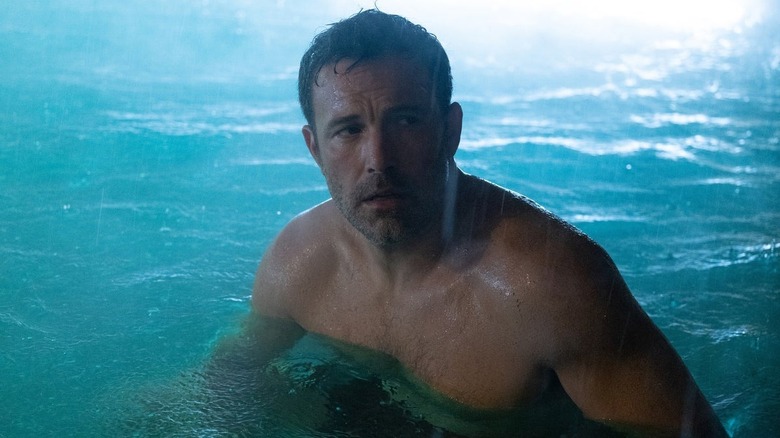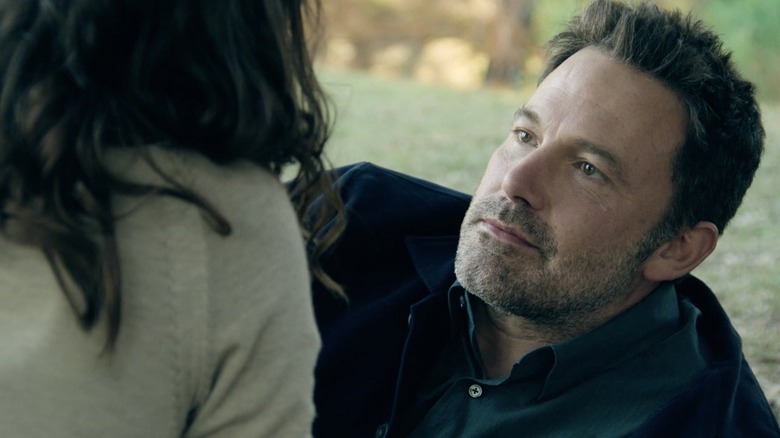Deep Water Review: Less Shallow Than It Looks
Sex scenes in cinema have never truly gone away, but in Hollywood movies, they are increasingly notable by their absence. In 2021, you could find everything from a sex scene between a serial killer and a car to lesbian nuns finding an alternate use for religious paraphernalia in some of the most acclaimed international films — whereas in the US, a chaste 10-second sequence in Marvel's "Eternals" was talked about as if it were breaking new ground. The arrival of "Deep Water," a new film by one of the most renowned directors of the erotic thriller, Adrian Lyne ("Fatal Attraction," "Indecent Proposal"), has been rumored from afar as a potential turning point back to the kinds of adult dramas that weren't afraid of prudish censorship. The fact that the Disney-owned 20th Century Studios shelved the release and sold it to streaming (Hulu in the States, Amazon Prime Video internationally) only increased speculation that the studio found its sexuality too obscene for the big screen.
If you've read any other reviews of "Deep Water," Lyne's first film in 20 years, you'll notice a common trend of disappointment that the project doesn't live up to expectations as an erotic thriller. Although sex is the driving force of the narrative, the director largely holds back on its depiction, seeing the story through the eyes of a jealous husband making himself queasy by just imagining what's happening behind closed doors — his own sexual encounters paling in comparison to what he believes is going on elsewhere. And as a thriller, many have labeled the film unintentionally hilarious, the tense tale of an unhappily married couple at breaking point treated like an overwrought melodrama, told without the structural elegance of the Patricia Highsmith novel from which it's adapted. It doesn't even adapt the source material's concluding chapters, instead ending in a moment of ambiguity you wouldn't expect from the man whose most famous film popularized the term "bunny boiler."
Drowning in toxicity
I do agree that if you go into "Deep Water" expecting a return to the heyday of the erotic thriller, from a director who helped turn the genre mainstream in the late '80s, you will be sorely disappointed. But it becomes very clear early on that this isn't the kind of film Lyne is interested in making, taking the bare bones of a battle-of-the-sexes erotic thriller plot and transforming it into a deliriously dark comedy, a satire of male insecurity at its most toxic with Ben Affleck in his best performance since Nick Dunne in "Gone Girl." Here, he's effectively playing that film's polar opposite; in David Fincher's film, he was the lousy husband the world saw as a spouse killer, whereas here, the wider world views him as a model husband, wronged by a wife they can barely hide their contempt for — the bodies piling up around him excused by everybody as a hilarious coincidence.
Vic (Affleck) and Melinda (Ana de Armas) are a couple kept from divorce only for the sake of their young daughter. The pair have previously made an arrangement that, in order to continue their marriage, Melinda is allowed to sleep with whoever she chooses — but because she keeps bedding partners considerably younger than her husband, his jealousy very quickly strikes. Goaded on by his friends, he engages in a series of deadly mind games with her partners of choice, their disappearances written off as a running joke, because how could such a loving father, and unfairly wronged husband, be responsible for something so heinous?
On the surface, it's easy to criticize "Deep Water" for outdated sexual politics; this is, after all, a story about an older man essentially punishing a younger woman for taking ownership of her sexuality, thinking that he has ownership of her body despite their open marriage arrangement. But the morals of the film are never on Vic's side, and it's not particularly subtle about it. In one recurring gag that makes it particularly hard to understand why many critics are failing to see the intentional dark comedy, Vic is revealed to have designed the technology that helps drones find people to bomb — something that earns him the affable nickname "war criminal" from his friendship group. "Deep Water" is set in a particularly toxic world where the worst male crimes are excused, and the most minor female indiscretions are punished.
There will be discourse
It's the sort of film that will revitalize tiresome discourse about the age gap between the two lead characters, even though that stereotypical imbalance of power is the driving force of the narrative, and the source of much of its satirical bite. It doesn't play with power dynamics to the extent you'd hope for in a film of this sort; brief sequences showing Melinda glancing at Vic when he sees her getting with other men, for example, suggest she may be in the driver's seat encouraging his murderous impulses — something the film drops to revert back to a more stereotypical "battle of the sexes" dynamic. However, it still very much weaponizes the casting of Affleck and de Armas, their unspoken age gap leading to an undercurrent of commentary on their respective generations' approach to sexuality. Lyne isn't afraid to use unsubtle imagery to visualize Vic's masculine insecurities in this regard; the casting of "Euphoria" star Jacob Elordi as one of Melinda's partners offers the visual shorthand of Affleck being completely dwarfed by someone younger and more confident than he is. That Affleck and Armas briefly dated following the filming of "Deep Water" makes the "Eyes Wide Shut" comparisons inevitable; that this is another film mis-marketed as an erotic thriller, despite being a darker comedy about male sexual insecurity, only heightens the similarities.
The film's third act, where Tracy Letts' Don Wilson, the only character even slightly skeptical of Vic, becomes more central to the drama sees the story become more of a conventional thriller. It's here where many have said the film becomes overtly laughable, although the murder mystery beats are played with a knowing wink. But the real point of contention is the seemingly abrupt ending; rumors of original test screenings where a third act triggered such vitriol that it has been excised entirely (this runs approximately 35 minutes shorter than that original cut) are the likely source of disappointment here. Some have even compared it to the infamous 2012 horror "The Devil Inside," which ended with an abrupt fade to black, and text onscreen telling audiences to visit a website to see the film's ending. That Sam Levinson, the creator and writer of "Euphoria," is a co-credited screenwriter has only added further fuel to this fire, especially as that show's second season was recently criticized for offering no payoff to several crucial plot threads.
However, the original ending of Highsmith's novel, in which Vic's controlling behavior towards Melinda reaches a deadly conclusion, would feel particularly jarring in an adaptation with a comparatively campy tone. The fact Lyne's film ends on a moment of ambiguity works for the better, suggesting that despite everything that happens, the relationship between Vic and Melinda keeps repeating the same cycle; that the end credits play out to a sequence of their daughter happily singing in the car on the school run suggests a family adapting to a new domestic normality. It's a significantly more satirical way to close this story than the more conventional thriller finale originally filmed.
While some may be upset that "Deep Water" isn't the erotic thriller its provocative trailers teased, I personally found it more rewarding: a satire of toxic masculinity, disguised as a delightfully trashy genre piece. It's the most fun I've had with a movie so far this year.


